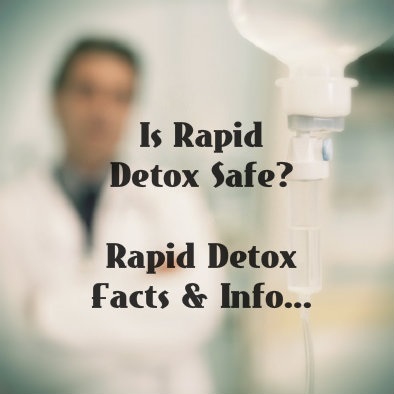Should You Try A Rapid Detox?
If you have been struggling with addiction, especially addiction to opioids like heroin or narcotic painkillers, you know how hard it is to kick the habit. As soon as you try to stop using, terrible withdrawal symptoms begin. They can be so severe that you feel you have no choice but to go back to using just to find relief. For many addicts the idea of a rapid, or even an ultra-rapid, detox is appealing. The promise of relief from withdrawal and an accelerated period of detox are tempting. But should you do it? There are risks and the effectiveness of such methods is not fully known. Before you think about going through with it, know the facts.
What Is Rapid Detox?
 Rapid detox is an accelerated way of getting a drug out of your system. A physician or nurse who will give you a dose of an opioid agonist, such as naltrexone, typically conducts it. This is a drug that blocks the effect of any opioid still in your body. You will also be given some type of sedative so that as your body goes through withdrawal, you may feel little or none of it. In other words, you sleep through your withdrawal in relative comfort. Ultra rapid detox involves the intravenous delivery of naltrexone to make the process occur even more quickly.
Rapid detox is an accelerated way of getting a drug out of your system. A physician or nurse who will give you a dose of an opioid agonist, such as naltrexone, typically conducts it. This is a drug that blocks the effect of any opioid still in your body. You will also be given some type of sedative so that as your body goes through withdrawal, you may feel little or none of it. In other words, you sleep through your withdrawal in relative comfort. Ultra rapid detox involves the intravenous delivery of naltrexone to make the process occur even more quickly.
Does Rapid Detox Work?
Rapid detox does work in the sense that it clears your body of opioid drugs. However, simply not using the drugs anymore would achieve the same result. The real question is whether rapid or ultra-rapid detoxes work any better for long-term recovery than a natural detox process. A few studies of rapid detox have failed to find that the technique is any better for patients than a normal detox. In fact, they found that addicts undergoing rapid detox feel just as bad when they wake up from the process as those that were not given medications to minimize discomfort. Furthermore, the patients getting a rapid detox had similar long-term success rates as other addicts receiving the same post-detox treatment.
Is Rapid Detox Safe?
So far, rapid detox seems to be safe, but the same cannot yet be said for ultra-rapid detox. A few patients have suffered serious harm from the latter, and all had pre-existing conditions. The use of anesthesia during ultra-rapid detox can be dangerous for those with certain conditions, like AIDS, heart disease, hepatitis or diabetes.
Although it may feel like it at the time, withdrawal symptoms will not kill you. What can cause an addict to die is going back to drug use after a period of abstinence. By abstaining for a period of time you can lose some of your tolerance for an opioid drug. This means that if you relapse after detoxing you run an increased risk of accidentally overdosing. If you do not back up your rapid detox with further treatment, you will be more likely to relapse. Some people think that going through the detox will cure them of addiction and that they need no more treatment. This is a dangerous attitude.
Overall, the evidence is pointing to the fact that a rapid detox will not help you, but that it is safe if you have no pre-existing conditions and if you engage in long-term treatments for your addiction after a detox. It is wrong to believe that a rapid detox is the answer to your problems. You may want to use it as one tool in fighting your addiction, but it is not a cure.
Learn More About How Withdrawal Treatment And Detox Has Changed Over Time



